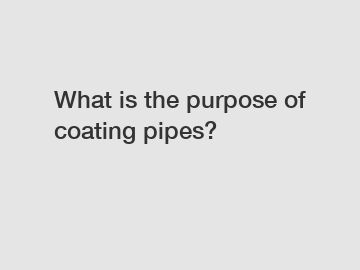What is the purpose of coating pipes?
Welcome dear readers! Today, we dive into the fascinating world of pipeline coatings — a crucial and often underappreciated aspect of infrastructure engineering. From safeguarding against corrosion to enhancing durability, pipe coatings play a significant role in ensuring long-term performance and reliability. In this blog, we will explore the purposes of coating pipes and shed light on the important role coatings play in maintaining the integrity of our pipeline networks.
Preserving Against Corrosion:
One of the primary purposes of coating pipes is to protect them against corrosion. As we all know, corrosion can result in costly repairs, shutdowns, and even catastrophic failures. To combat this menace, various types of protective coatings, such as fusion-bonded epoxy (FBE), polyethylene, and polyurethane, are applied to the external surface of pipes. These coatings create a barrier between the metal and its surrounding environment, effectively preventing corrosion caused by moisture, chemical exposure, or soil conditions.

Enhancing Durability and Longevity:
Coating pipes not only guard against corrosion but also enhance their overall durability and longevity. As pipelines traverse varied terrains, they encounter different external forces, including physical stress and temperature fluctuations. Pipeline coatings are specifically designed to withstand these challenges, providing an extra layer of protection. By preventing mechanical damage and abrasion, coatings significantly extend the lifespan of the pipes, reducing maintenance requirements and minimizing disruptions.
Ensuring Efficient Flow:
The smooth flow of fluids through pipelines is crucial for industries such as oil and gas, water distribution, and sewage systems. Pipeline coatings, particularly those with low friction properties, play a pivotal role in maintaining optimal flow efficiency. Coatings such as internal epoxies and polymers reduce frictional resistance, which otherwise could result in increased pumping requirements and energy consumption. By optimizing flow, these coatings not only improve operational efficiency but also contribute to overall cost savings.
Mitigating Environmental Impact:
In today's environmentally conscious world, pipeline operators must prioritize reducing their carbon footprint. Coating pipes can aid in this endeavor. Specialized coatings not only act as barriers against corrosion but can also provide insulation to reduce heat loss or gain. This insulation property helps preserve the temperature of transported fluids, lowering the energy demand for heating or cooling processes. By promoting energy efficiency, coatings effectively contribute to reducing greenhouse gas emissions and minimizing environmental impact.
Protecting Public Safety:
The safety of pipeline systems directly affects public safety. Pipe coatings help mitigate potential risks by preventing leaks and minimizing the release of hazardous materials. When pipeline coatings are damaged due to external forces or construction activities, the corrosion-resistant layers play a crucial role in preventing leaks, even under harsh conditions. Additionally, certain coatings contain materials that inhibit the growth of microorganisms, ensuring the safety of transported water or other sensitive fluids.
Promoting Sustainability:
As we strive for a sustainable future, pipeline coating technologies are evolving to cater to increasing environmental concerns. Innovative coatings now include materials derived from renewable sources, reducing the dependence on fossil-fuel-based products. Additionally, advances in coating manufacturing processes, such as powder coatings and water-based solutions, contribute to minimizing harmful emissions during application. By embracing sustainable coating practices, pipeline operators can align their operations with global sustainability goals and contribute to a cleaner future.
Conclusion:
In conclusion, pipeline coatings serve a vital purpose in safeguarding our infrastructure networks. By protecting against corrosion, enhancing durability, promoting efficient flow, mitigating environmental impact, ensuring public safety, and fostering sustainability, coating pipes play a pivotal role in the reliability and longevity of our pipeline systems. As technology and research continue to advance, we can expect further improvements in coating materials and techniques, strengthening the future of pipeline infrastructure. Remember, the next time you see a pipeline, take a moment to appreciate the hidden layers of protection that enable smooth and reliable transportation of essential resources.
The company is the world’s best Pipeline inner wrap tape, Polypropylene Geotextile Bitumen Cold Applied Tape, anti corrosive pipe wrapping tape supplier. We are your one-stop shop for all needs. Our staff are highly-specialized and will help you find the product you need.
95
0
0


Comments
All Comments (0)